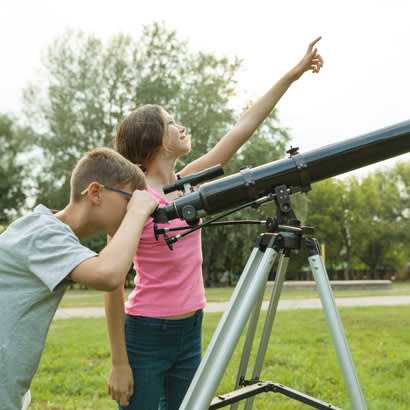
NRPA staff recently attended the National Mentoring Summit held in Washington, D.C. This annual gathering brings together more than 1,000 mentoring professionals from across the country to discuss how to foster positive youth development through effective mentoring. At the Summit, one presenter described mentoring as the process of “adding a bright star to a young person’s solar system.” As one of the largest providers of youth development programming in the country, park and recreation professionals regularly shine bright for youth in their communities.
Through the Mentoring in Parks and Recreation initiative, NRPA actively supports agencies in their efforts to build effective and evidence-based mentorship programs that connect youth with caring and compassionate mentors while strengthening connections across the community. To put this into action, NRPA has supported five park and recreation agencies over the past three years to implement youth mentoring programs. Through technical assistance, NRPA’s Youth Mentoring Framework, collaboration among grantees and sheer determination, these five agencies established their programs and opened their doors to youth in their communities, brightening many solar systems along the way. Now, at the end of the grant period, these five agencies have realized some remarkable outcomes – 133 mentees and 131 mentors participated in these mentoring programs.
To measure the impact of the mentoring program, grantee staff administered pre- and post- (six and twelve months) surveys to mentees and mentors. NRPA then matched the pre- and post-surveys of mentees and mentors to assess the percentage of mentees or mentors who experienced any change across program participation. Below is a summary of key outcomes:
Mentees improved their relationships with adults and increasingly valued their mentor.
The rate of mentees who reported they could count on their parents increased from the beginning of their involvement (pre = 83 percent) to after 12 months in the program (89 percent). As the program progressed, mentees also were more likely to say they could count on their mentors, with rates increasing 40 percentage points to 61 percent after 12 months in the program. When interviewed, a number of youth mentees shared their mentor had an open ear and they could talk to them about anything.

Mentees were more able to open up and talk about their feelings.
Mentees were increasingly more open to sharing their thoughts and problems with adults. The rate of mentees reporting they have adults to share thoughts and feelings with increased 10 percentage points to 96 percent after 12 months in the program.

Mentors also noted positive changes in their mentees’ willingness to open up/share emotions.
After six months, 61 percent reported their mentee was better able to open up/share emotions compared to when mentoring began; increasing to 71 percent after 12 months.
Mentors said their mentee is more open and willing to talk about things that are bothering them. Mentees agreed. They enjoyed having somebody to talk about things happening in their lives and with whom they could discuss their problems.
Mentees progressively participated more in community service and extracurricular activities outside of school.
The rate of mentees who engaged in community service increased 15 percentage points to 41 percent after 12 months in the program. Involvement in extracurricular activities increased at a similar pace, with 59 percent reporting involvement at the end of their participation.

Mentors learned how to be a better mentor.
Mentors reported substantial knowledge gains throughout their involvement in the program. Fifty-five percent increased their knowledge in some way across the four topical areas. The largest percentage learned how to better provide direction to mentees with respect to substance use. The rate of mentors rating themselves knowledgeable increased nine percentage points to 89 percent after twelve months in the program.
Mentors Identified positive changes in their mentees and had a role in those changes.
Mentors reported their mentees were increasingly 1) making better life decisions and 2) more focused on their future. One stated their mentee “has improved on his decision making in all aspects of his life…he now understands the consequences to his actions.” Mentors felt they had a moderate/big role in these positive changes. That perception increased among mentors who completed the entire twelve months of the mentoring relationship (from 78 percent at six months to 82 percent at 12 months).

Mentees shared that their mentor helped them deal with negative emotions and kept them “out of trouble.” One mentee saw their mentor as “somebody to go to whenever I’m mad,” while others shared their mentor has helped them do better in school. Virtually all agreed their mentor took time to talk with them; one mentee said their mentor empowered him to make his own decisions.
Do you want to implement your own youth mentoring program at your park and recreation agency? If so, check out NRPA’s Mentoring Resources. These resources will help your agency leverage local park and recreation assets to build protective factors around at-risk youth, while forming strong social connections and positive relationships to address trauma, adversity and other challenges that youth experience.
Now it’s your turn to join this movement and be part of this work! NRPA is excited to share that we have TWO open funding opportunities available for local park and recreation agencies and their community partners to support mentoring programs! The deadline to apply for these opportunities is March 31, 2023. Please review the applications for more details about each opportunity, including the benefits each grantee will receive, FAQs, and a scoring rubric to help you put together a compelling application! Reach out to mentoring@nrpa.org with any additional questions you have.
Let NRPA know about your interest in youth mentoring or any mentoring programs you are already operating by leaving a comment below!
Austin Barrett (he/him) is an Evaluation Manager with NRPA.


